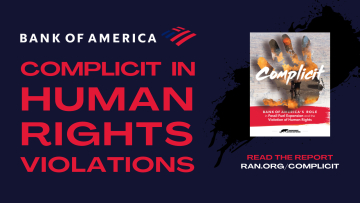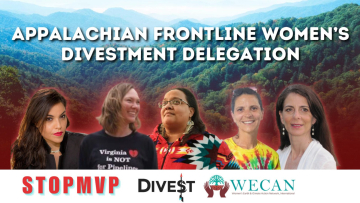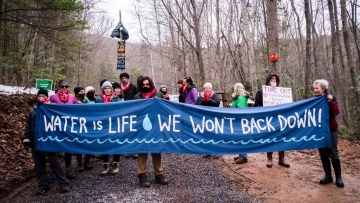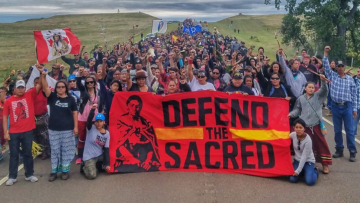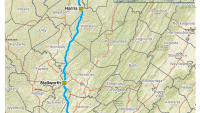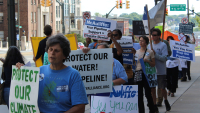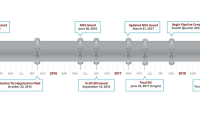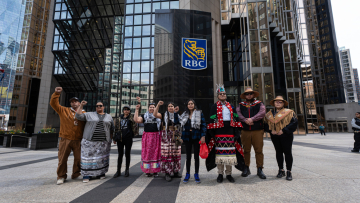
Project – On record
This profile is no longer actively maintained, with the information now possibly out of dateBankTrack & Oil Change International
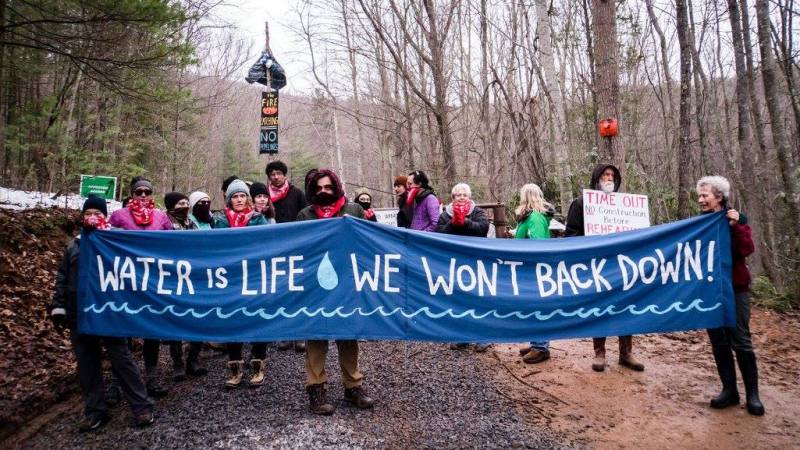
Project – On record
This profile is no longer actively maintained, with the information now possibly out of dateBankTrack & Oil Change International
Why this profile?
The route of the Mountain Valley Pipeline (MVP) crosses the Allegheny Highlands, threatening pristine forests, headwaters and steep, fragile terrain, as well as many residential communities, farms, and other properties along its route. The project is facing significant opposition from Indigenous communities, landowners and residents along its path.
What must happen
Private banks and other financial institutions that provide corporate finance to Equitrans Midstream Corporation and other companies involved in the MVP project must demand that the companies cancel the project. If the companies were to continue to pursue this project, their financiers must withhold and eventually end all financing for these companies.
| Sectors | Pipeline Transportation of Natural Gas |
| Location |
|
| Status |
Planning
Design
Agreement
Construction
Operation
Closure
Decommission
|
| Website | https://www.mountainvalleypipeline.info/ |
The Mountain Valley Pipeline (MVP) is a high-pressure pipeline that would carry fracked gas 303.5 miles in the Appalachian region. The pipeline is owned and constructed by Mountain Valley Pipeline LLC, a joint venture of Equitrans Midstream Corporation (which will also operate the pipeline) (47%), NextEra Capital Holdings (31%), Con Edison Transmission (10%), WGL Midstream (10%), and RGC Midstream (1%).
After being repeatedly halted by judicial challenges, construction of the MVP resumed in late August 2023, after Congress passed the 2023 Fiscal Responsibility Act, which accelerated the approval of permits for the construction and initial operations of the pipeline. MVP, LLC has obtained permits to extend construction until October 2026.
In 2018, an expansion to the pipeline was proposed, adding 75.1 miles and a new compressor station. The so-called MVP Southgate project has already been approved by the Federal Energy Regulatory Commission (FERC), but it has been on hiatus since 2020 after the North Carolina Department of Environmental Quality repeatedly denied the necessary water quality certifications.
Impact on human rights and communities
Impacts on landowners The threat of “eminent domain”, where the company benefits from the government’s right to acquire property for “public use”, has been widely employed in this project. MVP, LLC has sued landowners to force them to provide access to their land for construction surveying. Opponents suffer intense criminalisation, including peaceful blockaders facing terrorism charges.
Landowners impacted by the MVP Southgate project also complained of being repeatedly harassed and verbally bullied by MVP land brokers. Landowners are pressured to allow construction on their private lands, which would require a permanent easement of 50 feet (about 15 metres) and a temporary easement of 100 feet. The expansion project could also further impact landowners who already lost land to the construction of another major pipeline, Transco. The MVP will feed the gas fracked from the Marcellus and Utica shales to the Transco pipeline.
Impacts on public health The pipeline crosses a region with steep slopes, with 225 miles of pipeline running through high landslide-risk terrain. These natural characteristics increase the risk of damage and explosions once the pipeline becomes operational. Numerous private houses are located within the so-called ‘blast zone’, that is the quarter-mile radius area where, in case of an explosion, death or serious injuries are most likely.
The MVP Southgate project would increase the chance of polluting gases (methane, CO2, and NOx gas among others) and aerosol particles (VOCs) leaking from the pipeline. This project also entails the construction of a new compressor station in a predominantly black community near Chatham, Virginia. Compressor stations are generally responsible for higher rates of air pollution. Their engines often run on diesel or gas and the complex equipment is prone to leaks, polluting the air whenever they operate. The noise pollution caused by compressor stations, where multiple engines operate simultaneously, can also pose health risks by causing stress, sleep deprivation, and elevated blood pressure.
Furthermore, the construction of a pipeline of this capacity incentivises the extraction of fracked gas, with terrible consequences for the population in the vicinity of the shale. A 2019 scientific paper published by the US National Health Institute estimates that the fracking operations in the Appalachian basin, from 2004 (when fracking began) to 2016, caused between 1200 to 4600 premature mortalities associated with air pollutant emissions caused by the fracking activity. 54% of these mortalities are concentrated in the counties where fracking operations take place, while the rest are mostly concentrated in the downwind populous coastal Northeast regions.
Impacts on access to water Several counties in the pipeline route are laden with karst formations, particularly prone to sinkholes, sinking streams, and caves. Throughout construction, several of these formations have been severely damaged, with permanent disruption of water access by homeowners, water pollution, and flooding caused by the obstruction of cave structures where the water used to flow. Private wells have been irremediably damaged by construction, resulting in the loss of clean drinking water for numerous homes and farms.
Environmental injustice Communities of colour and economically challenged and rural communities are often targeted by pipeline companies, as they generally lack the financial and political power to oppose the projects and effectively fight back. The MVP crosses counties where low-income, elderly, and medically underserved populations live. Furthermore, the proposed MVP Southgate project would entail the construction of a compressor station in Lambert County, Virginia, in an area populated by a predominantly black community.
Impacts on Indigenous rights The MVP pipeline is designed to run through the ancestral lands of the Occaneechi, the Saponi, and the Monacan Indian Nation. The MVP Southgate would run through Monacan and Saponi lands. The pipeline route crosses counties where hundreds of culturally significant native sites are recorded. According to Indigenous activists, construction has already damaged burial grounds and other sacred sites. MVP, LLC denies these claims. Indigenous communities, who are actively involved in the resistance against the pipeline, have specifically been the object of strong harassment during and in the aftermath of protests. Indigenous activists are also campaigning against the increase in cases of sexual violence and missing indigenous women often connected to “man camps”, temporary settlements of construction workers along the pipeline.
Impact on climate
Emissions The pipeline is set to carry about two billion cubic feet of fracked natural gas daily. The gas is extracted from the Marcellus and Utica shales and would be transported through the MVP after which it will converge in the Transco pipeline to travel to the many LNG terminals in Louisiana and Texas.
A 2020 report from Oil Change International has estimated that the annual emissions of greenhouse gases from the entire MVP supply chain throughout the pipeline’s full life cycle would be equivalent to over 32 coal plants or nearly 24 million passenger vehicles. In the case of construction of the Southgate addition, the total annual emissions of greenhouse gases would rise to an astronomical 128.7 million metric tons, the equivalent of over 37 coal plants or 27.3 million passenger vehicles.
Flawed carbon offsets plan In July 2021, Mountain Valley Pipeline, LLC announced its intent to purchase carbon offsets to make the first 10 years of MVP’s operational emissions (Scopes 1 and 2) carbon neutral. 90% of these emissions would be compensated for with the purchase of offset credits related to the construction of a methane abatement project for a coal mine in Virginia unrelated to the project. The other 10% would be covered by among others “addressing” abandoned gas wells in Virginia and West Virginia. The plan does not deal directly with MVP’s own emissions of methane. The plan also exclusively covers the first ten years of operations of the pipeline. Additionally, the only emissions that are supposed to be offset are standard operational emissions, not Scope 3 emissions or the emissions caused by construction of the pipeline, testing, and possible leakages and explosions. Finally, the methane abatement project would be developed by a subsidiary of NextEra, one of the companies involved in MVP, making it both the buyer and the seller of the carbon offset credits.
No other information related to the Virginia abatement project or to any other carbon offset projects can be found on the MVP website and it is not clear whether its development ever began. The plan also does not mention the proposed MVP Southgate extension.
Impact on nature and environment
Impacts on forests and land The pipeline has major local environmental implications. Erosion, mudslides and soil disturbances have been a major problem during construction; this has led to massive influxes of mud to waterways, threatening local animal and plant life, some of which are endangered species. One expert noted of an 8-acre landslide that “events like this are almost expected; MVP chose to route…this titanic 42-inch diameter, 303-mile pipeline across several hundred of miles of “high landslide potential” areas.
The construction of the pipeline also requires the destruction of 4.856 acres of forest across West Virginia and Virginia. It has already caused and will further aggravate major impacts on the Jefferson National Forest. The project has already downed trees to clear a 125-foot wide right of way that runs through 3.5 miles of the forest. Despite the strong opposition by activists and local communities, in July 2023 the U.S. Supreme Court finally allowed construction through the forest, after the Court of Appeals for the 4th Circuit had previously halted it.
34% of the proposed Southgate extension route is forested and the construction of this extension would permanently damage 615 acres of forest, among which there are 12 acres of riparian forest (a natural barrier against possible floods) in the Jordan Lake watershed.
Impacts on waterways The pipeline is set to cross waterways 1.146 times along its 303-mile length. As of January 2023, 429 water crossings were still to be constructed. These crossings have posed strong concerns, including the risk of corrosion of the pipeline caused by the chemically-coated pipes degrading while sitting outside for long periods due to construction delays. Because of the static nature of the pipeline and the dynamic nature of a water stream, they are also the most fragile aspects of a pipeline, with high risks of exposure and rupture of the line while in operation. The consequences of such ruptures would be extreme pollution of waterbeds and flowing water, with severe damage to the local wildlife and the communities who rely on such water sources. Numerous endangered species that are native to the area impacted by the construction could be irremediably harmed.
Since the beginning of construction, the construction companies have committed hundreds of violations of water quality regulations, laws, and permits. These violations include, among others, unpermitted discharges into waterways and failure to repair erosion and control sediments. MVP, LLC has already been fined numerous times, in both Virginia and West Virginia, for these violations.
The proposed Southgate extension would also have a dangerous impact on the waterways of Virginia and North Carolina, crossing 207 streams and 3 ponds. Among these there are the Dan River, home to several endangered species, and the Stony Creek Reservoir, the main source of drinking water for the city of Burlington, North Carolina.
Other impacts
Financial unsustainability MVP has obtained the permits to continue construction until October 2026. This further extension will probably entail new increases in the total cost of the pipeline. Indeed, as of October 2023, the total budget has been raised from USD 6.6 billion to USD 7.2 billion. These cost increases have already required substantial investments and de facto shown how the project is not only a threat to the climate, the environment, and local communities but also financially unsustainable. There are also serious doubts that there might not be a market for the gas transported by the pipeline, as the four corporate customers who have signed deals with MVP have only committed to buying 35.5% of the MVP’s capacity.
The repeated halts and delays in the construction of the pipeline and hefty fines have nearly doubled its total costs, which are now estimated at USD 7.2 billion, as opposed to the initially budgeted USD 3.5 billion.
The clearest way to answer the question of who is financing the Mountain Valley Pipeline is to look at the finance for the companies behind Mountain Valley Pipeline LLC, a joint venture of Equitrans Midstream Corporation, NextEra Capital Holdings, Con Edison Transmission, WGL Midstream, and RGC Midstream. Equitrans and NextEra are the largest investors. Oil Change International research has found that Equitrans Midstream Partners (EQM), the largest investor in the project until 2020 and since then a subsidiary of EQT Midstream Corporation, has received US$9.5 billion from commercial banks in corporate financing (bonds, an unsecured loan and increases to the company's revolving credit facility) between 2014 and June 2020.
At the top of the list of the largest financiers of the five companies involved in MVP we find JPMorgan Chase and Wells Fargo, who both provided over 3 billion USD in finance to EQM Corp, NextEra, Con Edison, and WGL between 2018 and 2022. In third place, we find Bank of America, while other big financiers are Citigroup, Mitsubishi UFJ, TD, PNC, Barclays, Scotiabank, and Goldman Sachs. Except for PNC, all of these banks are members of the Net Zero Banking Alliance, pledging to reach net-zero greenhouse gas emissions by 2050.
The annual Banking on Climate Chaos report reveals the most recent finance data for EQM Corp, NextEra, Con Edison Transmission, and WGL Midstream.
Project sponsor
Equitrans Midstream Corporation
United StatesOther companies
Con Edison Transmission
United StatesNextEra Capital Holdings
United StatesRGC Midstream
United StatesWGL Midstream
United StatesApplicable norms and standards
2023
2023-11-02 00:00:00 | MVP Sues Protesters for Damages
Mountain Valley Pipeline, LLC sues six protesters for damages of more than USD 1.3 million. The protesters had chained themselves to construction equipment belonging to the company between July and September 2023, halting the pipeline’s construction. The company laments additional damages of USD 3 million against individual protesters and grassroot organisations which facilitated bail fund donations.
2023-09-11 00:00:00 | MVP Sues Activists for Damages
Mountain Valley Pipeline, LLC sues 41 individuals and two CSOs, seeking more than USD 4 million in damages. The company laments the loss in production caused by the 41 individuals, who have chained themselves to heavy equipment, walked onto restricted construction areas or taken other illegal steps against the pipeline. It is also suing the two organisations Appalachians Against Pipelines and Rising Tide North America for soliciting or accepting donations used to fund these actions against MVP.
2023-07-27 00:00:00 | U.S. Supreme Court Lifts Obstacle to MVP Construction in Jefferson National Forest
The U.S. Supreme Court lifts the order previously issued by the 4th Circuit Court of Appeal to hold construction of the MVP in Jefferson National Forest. The last legal obstacle to the MVP’s construction is lifted.
2023-06-03 00:00:00 | President Biden Signs The Debt Ceiling Bill
Despite its pro-climate political pledges, President Biden signs into law the debt ceiling bill, paving the way to the completion of the MVP.
2023-06-01 00:00:00 | The U.S. Senate Passes The Debt Ceiling Bill
The US Senate passes the 2023 Fiscal Responsibility Act.
2023-05-31 00:00:00 | U.S. House Passes The Debt Ceiling Bill
The U.S. House of Representatives passes the 2023 Fiscal Responsibility Act (debt ceiling bill), which executively approves all permits and authorisations necessary for the construction and initial operations of the MVP and denies federal judicial review of these permits and authorisations.
2020
2020-09-04 00:00:00 | U.S. Fish and Wildlife Service says MVP unlikely to threaten 5 endangered species
Nearly a year after the legal decision by the U.S. Court of Appeals that paused pipeline construction, the U.S. Fish and Wildlife Service determined that MVP, should it continue, is not likely to threaten the endangered or threatened species in question. Local groups take issue with this conclusion, as the project has violated common sense environmental protections over and over again. Restarting construction still depends on the FERC’s stop-work order being lifted, as well as a renewed permit from the U.S. Army Corps of Engineers to burrow under nearly 1,000 streams and wetlands. (Roanoke Times)
2020-08-11 00:00:00 | MVP 75-mile extension rejected by North Carolina Department of Environmental Quality
The North Carolina Department of Environmental Quality rejected Mountain Valley Pipeline’s proposal to extend the project into central North Carolina. The extension would have added 75 miles to the planned 300-mile pipeline route through Virginia, but was denied over concerns that the Virginia pipeline construction would ever be completed. The original project has been held up over paused permits related to impacts on endangered species. (The Roanoke Times)
2020-06-11 00:00:00 | MVP prepares for construction completion by early 2021
The Mountain Valley Pipeline is currently at 92% completion of the total project work, with the expected in-service date targeted for “early 2021". The project completion is contingent on receiving the assessment of the Biological Opinion and the FERC lifting the stop-work order issued last year to determine whether the project complies with the Endangered Species Act. These judicial decisions and regulatory setbacks have not only delayed the project timeline, but have also increased project costs. At present, MVP now expects the total project costs to exceed its already increased project estimate of $5.4 billion by 5%. (Business Wire).
2019
2019-10-16 00:00:00 | FERC orders all work to cease until further impact assessment complete
The Federal Energy Regulatory Commission (FERC) ordered all work on the Mountain Valley Pipeline be stopped except stabilization and restoration activities, primarily due to threats to four endangered or threatened species in the area. This action followed a federal court appeals decision to pause the permit for the pipeline until further review of the impact can be completed. However, the FERC’s orders leave it up to the company to define “stabilization” and to self-regulate on whether its continued activities would cause harm. (Virginia Mercury)
2019-10-11 00:00:00 | MVP receives back-to-back setbacks related to environmental impacts
The U.S. Court of Appeals put a hold on two required permits for construction until a complete assessment of the Biological Opinion and Incidental Take Statement is finalized, which considers the impacts to endangered species from the project. This decision immediately follows an announcement that Mountain Valley Pipeline will pay a penalty of over $2 million to the Commonwealth of Virginia due to water quality violations. (Sierra Club)
2017
2017-10-13 00:00:00 | FERC gives the go ahead to Mountain Valley Pipeline
On October 13, 2017, FERC granted approval for the Mountain Valley Pipeline. FERC endorsed the 42-inch diameter buried pipeline, slated to transport natural gas extracted by hydraulic fracturing in the Appalachian Basin (The Roanoke Times).
2017-06-23 00:00:00 | FERC's final environmental impact statement for Mountain Valley Pipeline elicits controversy
The federal agency that decides the fate of interstate natural gas pipeline projects declared on June the 23rd that the proposed Mountain Valley Pipeline “would result in limited adverse environmental impacts, with the exception of impacts on forest” — a conclusion project opponents said offers additional evidence of the agency’s bias toward approving pipelines (The Roanoke Times).
2017-06-09 00:00:00 | Groups challenge W.Va. certification for proposed Mountain Valley Pipeline
Richmond, VA — Environmental groups filed suit today challenging West Virginia’s certification for the proposed Mountain Valley Pipeline, which would transport fracked gas across West Virginia and Virginia. The proposed 300-mile, 42-inch pipeline would cross primarily undeveloped, rural agricultural and forested lands. The project would fragment the heart of one of the largest remaining wild landscapes in the United States, cutting through national forest land and the Appalachian Trail and crossing more than 1,000 streams and wetlands and several major rivers in its path (appvoices.org).
2017-05-15 00:00:00 | AppalMad and Sierra Club File Rebuttal to Mountain Valley Pipeline Claims
Karst geology experts have strongly condemned Mountain Valley Pipeline’s Draft Environmental Impact submittals to the Federal Energy Regulatory Commission regarding pipeline construction in sensitive karst terrain (landscapes formed from the dissolution of soluble rock). A 14 page rebuttal, prepared by Ernst Kastning and submitted on behalf of the Virginia Chapter of the Sierra Club by Appalachian Mountain Advocates attorneys Benjamin Luckett and Joseph Lovett describes the risks to Southwest Virginia and West Virginia communities from pipeline construction. Damage would include groundwater contamination, groundwater recharge, surface collapse and other dangerous consequences of building a massive infrastructure project in a seismic area populated with caves and sinkholes.
2017-04-04 00:00:00 | Environmental Impact Statement delayed
The Federal Energy Regulatory Commission (FERC) said in a notice that it is pushing back its environmental review schedule for the Mountain Valley Pipeline (MVP) and related Equitrans Expansion Project (EEP) by a little over three months (NGI).

